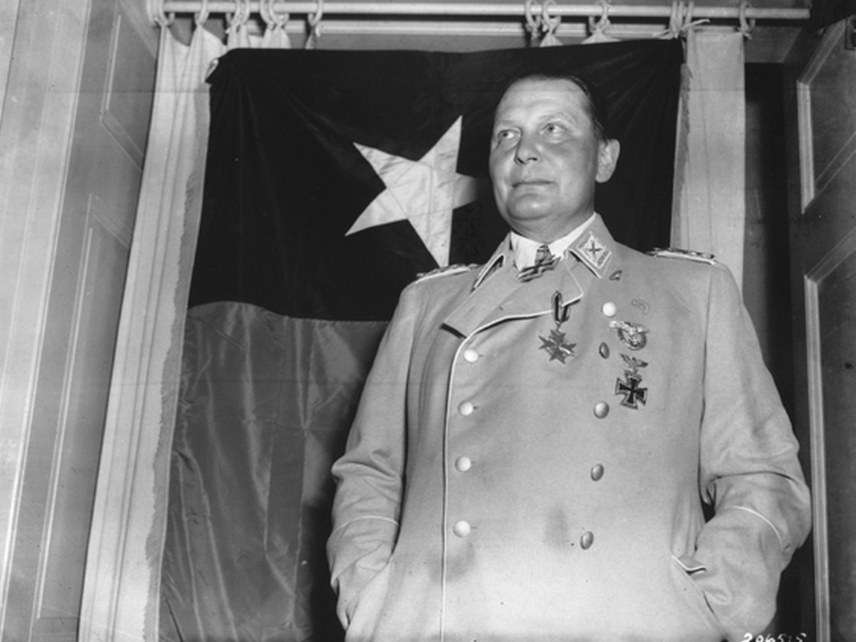Series on Hunt for Nazi Treasures Mostly Chases Rumors
This is not The Monuments Men.

Nazi Treasure Hunters. American Heroes Channel. Tuesday, May 1, 10 p.m.
For many years I've scoffed at people who say the earth's supply of oil will run out soon. My argument is that future technologies which might help us pump oil that's currently inaccessible cannot be predicted. It turns out this is also true of the television supply of TV shows about Nazis. Just when I thought every single known fact about them had been turned into a History Channel documentary, the industry unleashed its version of All The Time television has been guaranteed for several centuries more.
The first poisonous fruit of this endeavor is the American Heroes Channel's Nazi Treasure Hunters. Which is not, as it turns out, a show in which people don coal-scuttle-shaped helmets and march around on the beach waving metal detectors.
Rather, it's a show about historians chasing old rumors of stolen gold, art and antiquities supposedly stashed away by high-ranking Nazis in the final days of World War II, in hopes they could be retrieved in some kind of Boys from Brazil afterlife.
Nazi kleptomania is no rumor, but a cruel fact; especially in the early days of the war, as the German army dispatched its enemies with shock-and-awe rapidity that inflicted relatively little physical damage, systematic looting was the order of the day. And much of the pilferage was not found at the end of the war.
But all that buried treasure has been assiduously hunted for more than seven decades now. Though there's an occasional exception, most of the old leads have long been played out, though obviously the awesome half-life of the Nazis on television has not.
The first episode of Nazi Treasure Hunters concentrates on the incredible collection of stolen artwork amassed by Hermann Goering, head of the German air force and the second most powerful man in Hitler's regime.
On the list of evil Nazi deeds in need of redress, Goering's pilfered art collection may seem to rank somewhere south of the 6,000,001th most egregious.
But the sums of money, seriously considered, are staggering. A single collection looted by Goering from a Dutch art dealer is believed to have been worth hundreds of millions of millennial dollars.
But whoever's got the Goering goodies—If, indeed, they still exist; the final days of Hitler's Germany were a frenzy of Allied bombing and Red Army annihilation—probably has nothing to fear from the wannabe Indiana Joneses of this show.
With much fanfare, they find a hole leading into a decrepit old bunker beneath the site of a Goebbels mansion where much of his art was stored. (Purloined paintings covered so much wall space that Goebbels began mounting them on the ceilings.) The magnificence of this discovery is only somewhat diminished by the fact that modern graffiti artists have preceded them; or that the bunker was thoroughly searched by East German authorities before they razed the house above it.
Then there's Stolpsee, a German lake into the middle of which Gestapo officers in 1945 supposedly dumped three large crates. Not the least of the problems with this one is that it's hard to imagine why Goering would have picked the bottom of a lake to store precious paintings, not to mention what would be left of them 70-odd years later.
No matter: the official finding of the treasure hunters, after flailing around for a few hours in scuba gear, is that the bottom of the lake is really muddy—who could have imagined?—and who knows what might have sunk in there? At that, the Treasure Hunters fellows still come off less silly than a team of divers on another lake expedition funded by CBS a few years back; they triumphantly surfaced with a sealed metal container, which, when opened, proved to be full of beer-bottle caps and a message: "Sorry, not this time."
In other cases, the team is searching (or pretending to; the editing of Treasure Hunters is magnificently dodgy) for artwork that's already been recovered. The entire enterprise is transparently phony that it's likely to do serious damage to the previous solid reputations of two of the men involved: Robert Edsel, author of The Monuments Men, an account of early Nazi-treasure hunters, and World War II historian James Holland.
The third of the treasure hunters, Irish-born Conor Woodman, bills himself as an "investigative journalist," but is better known as the host of various dubious European reality-TV shows and seems to have found his real place in television with Treasure Hunters. My guess is he'll next turn up hosting The Real Housewives Of Berchtesgaden, or perhaps a reality TV version of the classic Angry Samoans ballad of Nazi-treasure hunting, They Saved Hitler's Cock.


Show Comments (11)